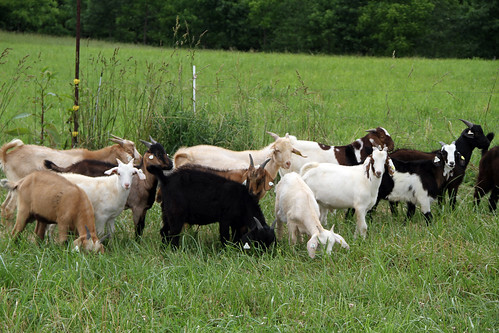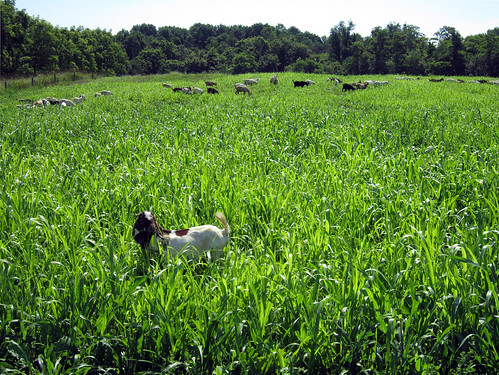The nomination period for the 2014 Western Maryland Pasture-Based Meat Goat Performance Test is open. The deadline to receive nominations is May 15. All nominations received by the deadline will be treated equally. If nominations exceed test capacity, preference will be given to previous consignors and Maryland residents. So far, 15 goats have been nominated by three previous consignors.
The test is open to any goat breeder from any state with any breed of goat. Eligible male goats must have been born between December 15, 2013, and March 15, 2014, and weigh between 35 and 70 lbs. upon delivery to the test site on Friday, May 30. All goats must be delivered to the test site on May 30 between 9 a.m. and 2 p.m., unless prior permission has been obtained for earlier delivery. No goats will be accepted after May 30.
The goats most likely to perform well in the test are those that have not been fed for maximum gain and those that have had previous exposure to gastro-intestinal parasites (especially Haemonchus contortus). Deworming suppresses the animal's natural ability to develop immunity to parasites.
Consignors are encouraged to select goats that are in the mid-range of the age and weight requirements. A minimum consignment of three goats is suggested. Up to 5 goats will be accepted per consignor, pending the total number of consignments received. It is not necessary to designate specific goats at the time of nomination.
Upon arrival to the test site, the goats will stand in a footbath containing zinc sulfate. Hooves should be properly trimmed to allow the solution to penetrate the entire hoof. Each goat will be dewormed with anthelmintics from each drug class: moxidectin (Cydectin®), albendazole (Valbazen®), and levamisole (Prohibit®).
The water will be medicated with Di-Methox® for the first five days, as a preventative for coccidiosis. Fecal samples will be collected to determine initial fecal egg counts and dewormer effectiveness. The triple dosing is expected to reduce fecal egg counts to (near) zero. Other performance tests eliminate animals if fecal egg counts are not sufficiently reduced by initial treatments, as this is an indication of anthelmintic resistance.
After a short adjustment period, this year's test will be split into two phases. During the first 42 days of the test, the goats will face a "parasite-challenge." They will graze cool season grass paddocks that have been pre-contaminated by grazing sheep. The parasites carried by the sheep have been confirmed to be susceptible to moxidectin (Cydectin®) and levamisole (Prohibit®).
During the second 42 days of the test, the goats will enter the "growth-challenge" phase. They will graze clean, tall, nutritious annual pastures. Fecal samples will be collected to determine the nutritive value of the diet the goats are consuming.
Gel caps containing 0.5 g of copper oxide wire particles (COWP) will be administered to the goats at the end of each challenge phase. COWPs have been shown to reduce parasite burdens in kids and lambs. Copper plays an important role in immunity.
Questions about this year's test should be directed to Susan Schoenian at (301) 432-2767 x343 or sschoen@umd.edu. Nomination packets can be requested (by mail) by contacting Pam Thomas at x315 or pthomas@umd.edu.
 |
| Goats at beginning of test (2012). |
The test is open to any goat breeder from any state with any breed of goat. Eligible male goats must have been born between December 15, 2013, and March 15, 2014, and weigh between 35 and 70 lbs. upon delivery to the test site on Friday, May 30. All goats must be delivered to the test site on May 30 between 9 a.m. and 2 p.m., unless prior permission has been obtained for earlier delivery. No goats will be accepted after May 30.
The goats most likely to perform well in the test are those that have not been fed for maximum gain and those that have had previous exposure to gastro-intestinal parasites (especially Haemonchus contortus). Deworming suppresses the animal's natural ability to develop immunity to parasites.
Consignors are encouraged to select goats that are in the mid-range of the age and weight requirements. A minimum consignment of three goats is suggested. Up to 5 goats will be accepted per consignor, pending the total number of consignments received. It is not necessary to designate specific goats at the time of nomination.
 |
| Cool season grass paddock (2012). |
Upon arrival to the test site, the goats will stand in a footbath containing zinc sulfate. Hooves should be properly trimmed to allow the solution to penetrate the entire hoof. Each goat will be dewormed with anthelmintics from each drug class: moxidectin (Cydectin®), albendazole (Valbazen®), and levamisole (Prohibit®).
The water will be medicated with Di-Methox® for the first five days, as a preventative for coccidiosis. Fecal samples will be collected to determine initial fecal egg counts and dewormer effectiveness. The triple dosing is expected to reduce fecal egg counts to (near) zero. Other performance tests eliminate animals if fecal egg counts are not sufficiently reduced by initial treatments, as this is an indication of anthelmintic resistance.
After a short adjustment period, this year's test will be split into two phases. During the first 42 days of the test, the goats will face a "parasite-challenge." They will graze cool season grass paddocks that have been pre-contaminated by grazing sheep. The parasites carried by the sheep have been confirmed to be susceptible to moxidectin (Cydectin®) and levamisole (Prohibit®).
 |
| Annual grass pasture (2012). |
During the second 42 days of the test, the goats will enter the "growth-challenge" phase. They will graze clean, tall, nutritious annual pastures. Fecal samples will be collected to determine the nutritive value of the diet the goats are consuming.
Gel caps containing 0.5 g of copper oxide wire particles (COWP) will be administered to the goats at the end of each challenge phase. COWPs have been shown to reduce parasite burdens in kids and lambs. Copper plays an important role in immunity.
Questions about this year's test should be directed to Susan Schoenian at (301) 432-2767 x343 or sschoen@umd.edu. Nomination packets can be requested (by mail) by contacting Pam Thomas at x315 or pthomas@umd.edu.











